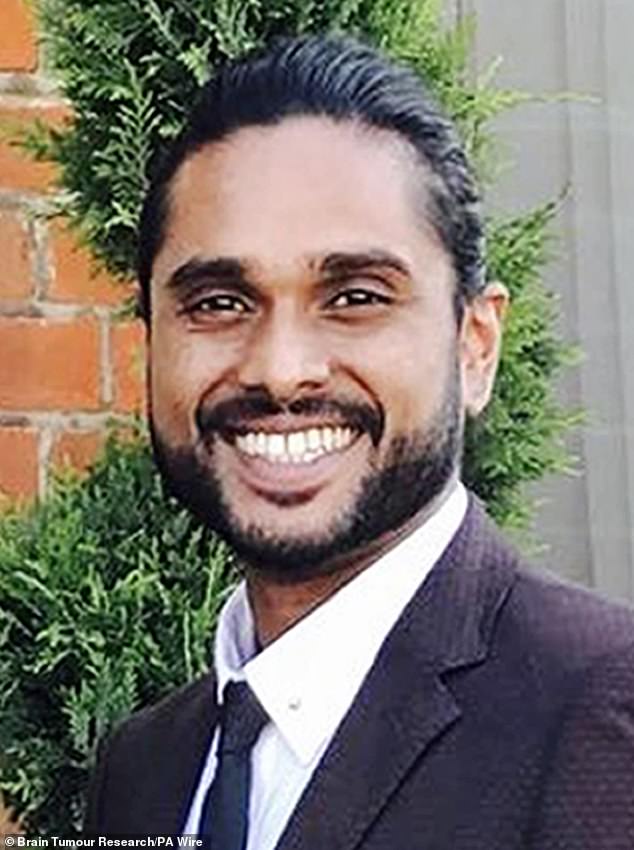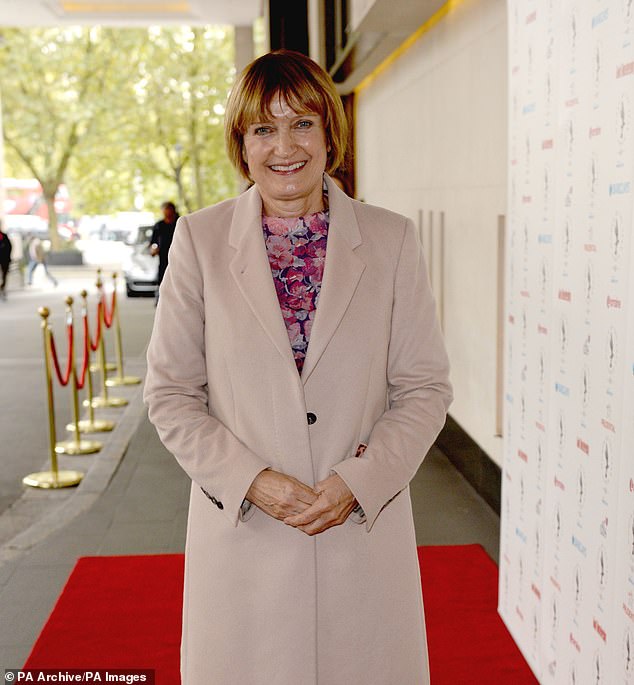A fit and healthy father-of-two received a devastating brain tumour diagnosis after a bizarre symptom triggered a violent seizure—a lasting smell of bleach.
Sam Suriakumar, 40, from London, didn’t think much of it the first time he smelled the strong ammonia-like chemical, assuming that his wife, Sindu, had just cleaned the bathroom.
‘The smell of ammonia, bleach or some sort of cleaning agent was almost filling up my mouth, it was really strong,’ he recalled.
‘I felt like I needed to lean against the wall to stand, I felt very strange but didn’t think much of it.’
But, when the strong smell returned the following morning whilst he was working out outdoors, accompanied by a bout of dizziness, alarm bells began to ring.
On the tube home, the musician suffered a violent grand mal seizure—also known as a tonic-clonic seizure—which causes a person’s muscles to stiffen and their limbs to jerk uncontrollably as they lose consciousness.
Recalling the lead up to the events, Mr Suriakumar said he felt drained of energy on his commute home on the busy Northern Line of the London Underground.
‘I closed my eyes and it felt like half an hour went by, but we had only moved one stop,’ he said.

Sam first smelled the strong chemical in the bathroom so didn’t think much of it, until it hit him whilst he was working out outdoors
He closed his eyes once more, hoping to drift off on his journey home, but to his surprise he woke up 48 hours later at St George’s Hospital, Tooting.
He said: ‘My medical team told me that I had suffered a massive grand mal seizure.
‘I seized so bad that I dislocated my shoulder,’ he added.
The father-of-two was rushed to hospital in an ambulance, during which time he suffered two more seizures.
After a series of tests including a CT scan which showed a ‘large shadow’ across the left side of his brain, he was diagnosed with a brain tumour, which doctors suspected was a low grade glioma on February 4 2024.
When he was told that the tumour was covering the part of his brain responsible for speech, movement and memory, he said his whole world ‘spiralled out of control.’
‘My mind went straight to my girls, who were only three and five at the time,’ he said.
‘All of a sudden, your priorities become very clear.’

Sam now has regular scans to monitor how successful the treatment was as his surgeons look out for the tell-tale signs of cancer
Despite Mr Suriakumar being ‘in the best shape of his life’, doctors were hesitant to operate on the tumour.
Instead, they decided to go for a less invasive approach, treating Mr Suriakumar symptoms rather than the tumour itself.
‘It was a case of not wanting to poke the bear,’ he added.
For two years his condition remained stable, enabling him to run the London Marathon in 2023 to raise money for Brain Tumour Research and becomes a support ambassador raising £60,000 to date.
However, in July 2023 when he was in Brazil for a wedding, Mr Suriakumar received a sobering call from his neurosurgeon: the tumour had grown.
‘It knocked me to my feet,’ the musician recalled.
Shortly after flying home, he underwent surgery to have some of the tumour removed—which confirmed a diffuse oligodendroglioma, a type of glioma which is often benign but can become cancerous.
Just two weeks later, he started the first of 30 gruelling rounds of radiotherapy at the Royal Marsden Hospital.

Glioblastoma, which is the most common type of cancerous brain tumour in adults, also killed the Labour politician Dame Tessa Jowell in 2018.

The Wanted star Tom Parker died in March 2022 following a year-and-a-half long battle with glioblastoma aged just 33 (pictured in December 2021)
This was followed by nine long months of chemotherapy, which the father-of-two successfully completed in September last year.
Determined not to give up and lose faith, the avid gym-goer completed the HYROX indoor fitness competition in Belgium just six months later—tackling eight kilometers of running and eight functional workout exercises.
His medical team are now closely monitoring his condition through regular scans every six months to better understand the impact of the treatment, in what Mr Suriakumar described as a ‘sitting on the fence’ phase.
Looking back, he said: ‘Brain tumours are the biggests killers of children and adults before the age of 40, so reaching that milestone on July 26 was a big deal for me.’
He is now urging anyone in a similar situation to stay positive.
He said: ‘Your brain talks to every single part of your body and it’s so important to have a positive mindset.
‘It’s not going to come every single day, but try to find those things that inspire and encourage you to move forward.’
Over 12,000 patients in Britain are diagnosed with a brain tumour each year, with about half of these cases being cancerous.
Glioblastomas, one of the deadliest types of brain tumour, have been highlighted in recent years after killing a number of famous faces.
The disease, which is the most common type of cancerous brain tumour in adults, killed the Labour politician Dame Tessa Jowell in 2018.
And in March 2022, The Wanted singer Tom Parker died following an 18-month battle with the cancer.












